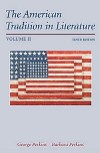 |  The American Tradition in Literature, Volume 2, 10/e George Perkins,
Eastern Michigan University
Barbara Perkins,
University of Toledo-Toledo
OrientationEzra Pound, along with other poets, pioneered a "school of poetry" that they called "Imagism." The term refers primarily to what Amy Lowell referred to as a "re-birth of the spirit of truth and beauty. It means a re-discovery of beauty in our modern world, and the originality and honesty to affirm that beauty in whatever manner is native to the poet" (Tendencies in Modern American Poetryhttp://www.english.uiuc.edu/maps/poets/g_l/amylowell/imagism.htm) Ezra Pound embraced the Imagist principles in the execution of his own work. Additionally, he drew widely upon esoteric libraries of readings, alluding to content with which most readers of his own day and later were unfamiliar--hence the density and obscurity of many of his works. |
|



 2003 McGraw-Hill Higher Education
2003 McGraw-Hill Higher Education